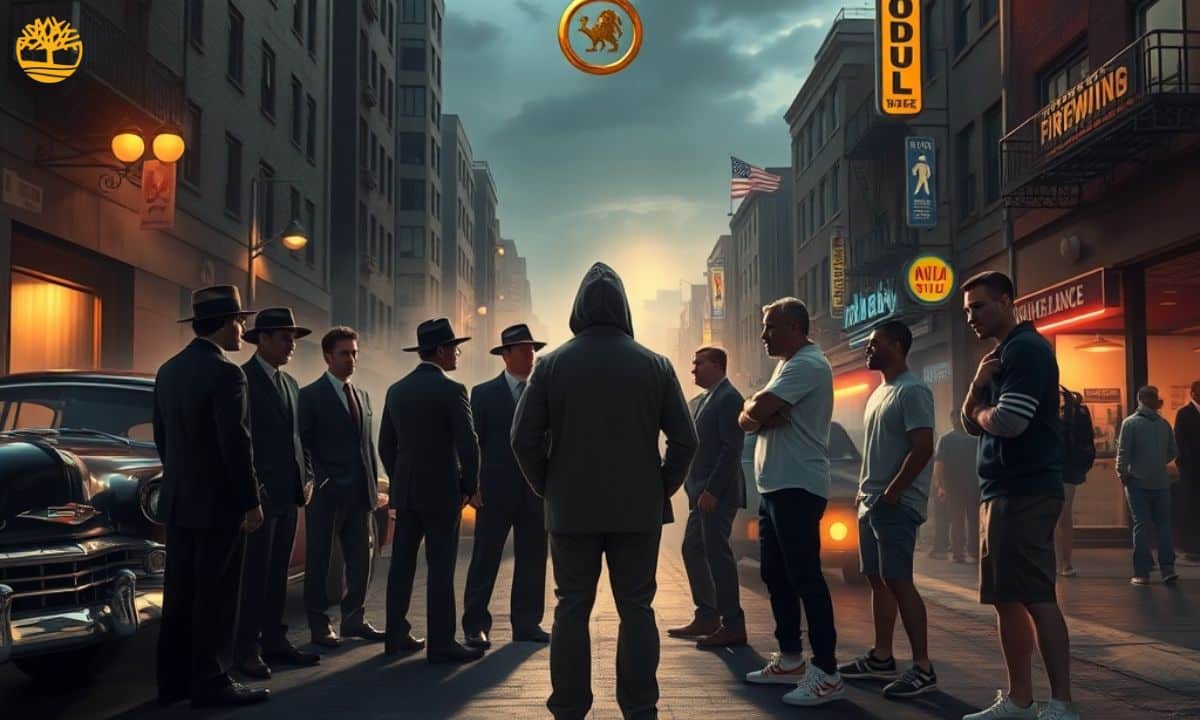Ever wondered what the word Goodfella really means? For some, it brings to mind mobsters, loyalty, and the iconic Scorsese film. For others, it’s a casual nod to a man who’s trustworthy, loyal, and respected in his circle.
In 2025, the term has evolved beyond crime and cinema. It’s used in texts, social media, and everyday conversations to describe respect, brotherhood, and even street smarts. Let’s explore the origins, usage, and modern alternatives of Goodfella that still shape how we speak today.
What Does Goodfella Mean?
A Goodfella refers to a man who is loyal, dependable, and trusted within his circle. The word also carries strong ties to brotherhood and respect. Today, it is used in both casual and cultural contexts, often shaped by media influence.
Traditional Meaning of Goodfella
In its earliest sense, Goodfella came from the idea of a “good fellow,” meaning a kind, respectable, and dependable man. It was about being seen as a person others could trust and look up to. Over time, this meaning shifted, taking on layers of cultural and social weight.
As slang evolved, Goodfella started to represent more than just a good man. It became tied to groups, loyalty, and even a sense of toughness. In some contexts, it hinted at someone who lived by a personal code of honor, whether in friendships or in darker circles.
Goodfella in Popular Culture and the Mafia
The Mafia gave Goodfella its most powerful meaning, referring to a “made man” who had earned respect and protection. Within the mob, being a Goodfella meant loyalty, silence, and living by strict codes. It was not just a title, but a lifetime bond.
Pop culture then spread the word worldwide. Movies, TV shows, and music portrayed Goodfellas as symbols of power, loyalty, and danger. This mix of admiration and fear shaped how the public viewed the term, blending crime with charisma.
Interesting facts:
In the Mafia, a Goodfella meant a made man—a member officially inducted into the family. This title came with respect, protection, and lifelong loyalty, but also a strict code of silence (Omertà).
Martin Scorsese’s 1990 film Goodfellas made the word globally famous. After its release, “Goodfella” entered everyday slang, often used to describe loyalty or toughness, even outside Mafia culture.
The Origins of Goodfella
The word originated from the old English phrase “good fellow,” which meant a trustworthy or friendly man. Over time, as language evolved, it turned into the slang form Goodfella. It began appearing in urban speech and eventually tied itself to organized crime.
From “Good Fellow” to Slang
Originally, calling someone a “good fellow” was a warm compliment. It was about kindness, reliability, and good character. In common use, it was positive and had no criminal connection at all.
But slang often reshapes meaning. Over decades, Goodfella shifted into a phrase used in underworld culture. Instead of just a kind man, it began to mean someone who was part of a tight-knit, code-driven group with rules of loyalty.
The Influence of the 1990 Film Goodfellas
Martin Scorsese’s 1990 classic film turned the term into a global icon. Starring Ray Liotta, Robert De Niro, and Joe Pesci, Goodfellas showed the rise and fall of mobster Henry Hill. The movie gave the word a permanent link to Mafia culture.
Since then, Goodfella has never been the same. Audiences saw it as more than slang—it became tied to crime, loyalty, betrayal, and brotherhood. Even in 2025, when someone says Goodfella, most people instantly think of the Mafia or the film.
Goodfella in Text and Everyday Language

The word Goodfella is often used in daily conversations and online chats. It can mean a trusted friend, a respected man, or someone with street smarts. Its tone changes based on context, making it both playful and serious.
Friendly and Respectful Usage
In casual talk, Goodfella can simply mean a good friend or loyal companion. People use it to appreciate someone dependable, kind, and always there when needed. This makes the term a warm way to show respect and admiration.
For example, a text like “Thanks for helping me out, you’re a real Goodfella” highlights loyalty and trust. It carries no criminal meaning here, just friendship. Used this way, it’s close to saying “buddy” or “one of the good guys.”
Street-Smart and Pop Culture References
In other cases, the word reflects a street-smart image. It hints at toughness, cleverness, or someone who knows how to survive in difficult places. This adds an edge to the compliment, giving it more weight than a simple “friend.”
Pop culture fuels this meaning. In movies, hip-hop, and TV shows, Goodfella often refers to someone with influence, style, and respect. It blends admiration with a hint of danger, making the term exciting in urban slang.
Deeper Cultural Interpretation of Goodfella
Beyond slang, the word Goodfella carries cultural weight. It speaks of loyalty, honor, and belonging, but also of moral ambiguity. This duality makes it fascinating across different generations.
Brotherhood, Loyalty, and Respect
The strongest cultural tie of Goodfella is to brotherhood. It reflects a man who values deep bonds and unshakable trust. In close circles, being called a Goodfella means you’ve earned genuine respect.
This respect comes from loyalty. A Goodfella is seen as someone who never betrays his people and always stands firm. The word has become a symbol of unity, reminding people of codes stronger than ordinary friendships.
The Darker Side: Crime and Code of Honor
On the other hand, the word also connects to crime. In Mafia culture, a Goodfella is a “made man,” bound by secrecy and violence. This meaning is far from friendly but rooted in power and fear.
The darker side includes codes like Omertà (the vow of silence). Here, being a Goodfella is not about kindness, but absolute loyalty to a criminal world. This side of the term still shapes how many people interpret it today.
Alternatives to Goodfella Based on Context

Choosing the right word instead of Goodfella depends on your tone and audience. Sometimes you want something polite, sometimes professional, and other times just casual and friendly.
Polite Alternatives
When formality matters, polite alternatives show respect without slang. These words fit well in writing, formal talks, or when describing someone with dignity.
- Gentleman – refined and respectful.
- Honorable person – admired for integrity.
- Kind fellow – warm and friendly tone.
- Respectable man – highlights good character.
Professional Alternatives
In a workplace or business setting, the term Goodfella feels too casual. Instead, choose professional phrases that stress dependability and trust.
- Trusted associate – reliable and responsible.
- Reliable colleague – dependable team player.
- Dependable partner – good in cooperation.
- Valued team member – shows appreciation and respect.
Casual Alternatives
For friends, family, or relaxed chats, casual alternatives keep the tone light and fun. These are perfect in texting or informal conversations.
- Buddy – classic, friendly term.
- Pal – easygoing and cheerful.
- Homie – urban slang for close friend.
- Bro – shows brotherly connection.
- Mate – common in British and Aussie slang.
Examples of Using Goodfella or Its Alternatives
The word Goodfella can shift its meaning depending on tone and setting. It may sound respectful in formal use or playful in casual chats. Here are examples showing how the term works across contexts.
Polite & Professional Contexts
In polite conversations, people prefer alternatives to avoid slang. Saying “gentleman” or “honorable man” feels more respectful. These choices keep the tone formal while expressing trust and loyalty.
In professional settings, phrases like “trusted associate” or “dependable partner” fit better. They highlight reliability without sounding too casual. This makes them ideal in business or workplace communication.
Casual & Pop Culture Contexts
Among friends, Goodfella often means a solid buddy or loyal pal. It’s used warmly to show appreciation, like “Thanks bro, you’re a real Goodfella.” The tone here is easygoing and affectionate.
Pop culture gives the word an edge. In movies, music, or urban slang, Goodfella suggests street smarts, influence, and toughness. Used this way, it carries charisma with a hint of danger.
Nuances of Tone When Using Goodfella
Tone plays a major role in how Goodfella is understood. It can feel light and friendly or carry a harder, streetwise edge. Knowing this difference helps you use it correctly.
Warm and Friendly
Used warmly, Goodfella is a compliment for loyalty and kindness. Friends might use it to praise someone dependable. In this sense, it’s close to saying “good guy” or “true friend.”
For example: “You’re a Goodfella for always helping out.” Here, the word highlights trust and respect. No crime or edge is implied, only genuine appreciation.
Toughness and Street-Smart Undertone
In another tone, Goodfella points to strength and survival skills. It suggests someone who knows how to navigate tough situations with grit. This meaning often comes from urban culture and Mafia-inspired media.
For instance: “He’s a real Goodfella—sharp, fearless, and respected.” Here the word implies not just loyalty, but also power. It carries an aura of toughness mixed with respect.
Frequently Asked Questions
Is Goodfella Positive or Negative?
It can be both. Positive when used to praise loyalty and friendship, but sometimes negative due to its Mafia and crime links.
Where Does the Term Come From?
It comes from the phrase “good fellow.” Later, it was popularized by Mafia culture and the famous 1990 film Goodfellas.
Can I Use Goodfella in Formal Conversations?
Generally, no. It’s best for casual or cultural settings. In formal talks, use gentleman, colleague, or trusted associate instead.
What Are the Best Alternatives?
That really depends on context. In polite situations, words like gentleman or honorable man work best because they show respect. In professional settings, you might say reliable colleague or trusted partner to highlight dependability. For casual conversations, terms such as buddy, bro, or homie keep the tone friendly and relaxed.
Conclusion
The term Goodfella is more than just slang—it carries layers of meaning. From loyalty and friendship to crime and toughness, it blends culture with character. Its interpretation depends on tone, context, and who’s saying it.
Even in 2025, the word remains powerful and versatile. Whether used warmly among friends or tied to pop culture’s Mafia image, Goodfella symbolizes respect, loyalty, and an unspoken code that continues to captivate people worldwide.

Muhammad Shoaib is a seasoned content creator with 10 years of experience specializing in Meaning and Caption blogs. He is the driving force behind ExactWordMeaning.com, where he shares insightful, clear, and engaging explanations of words, phrases, and captions.











